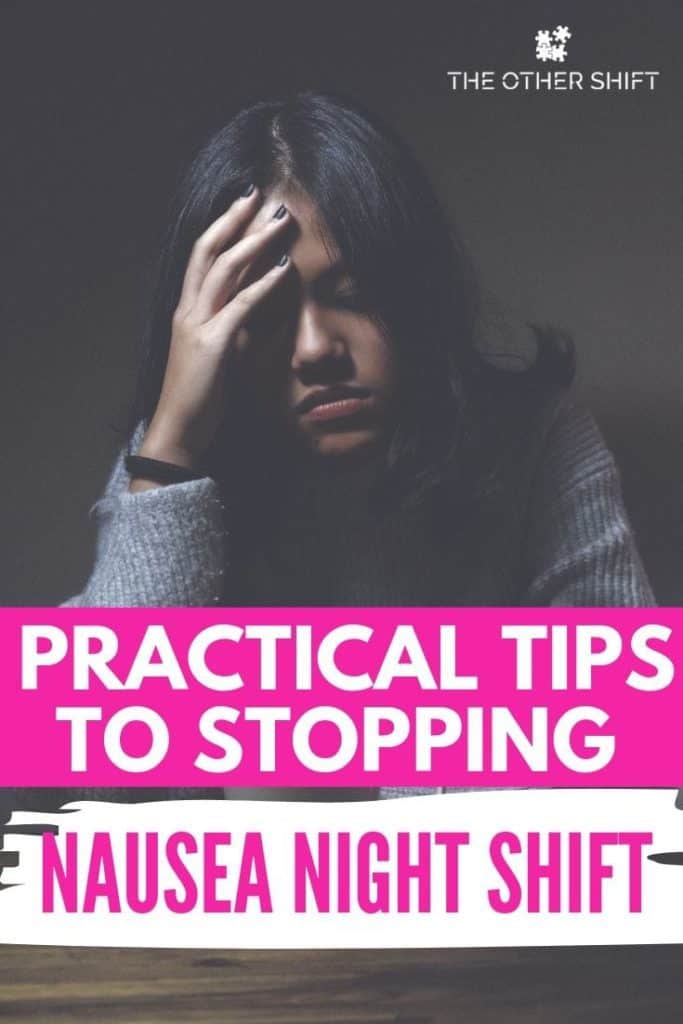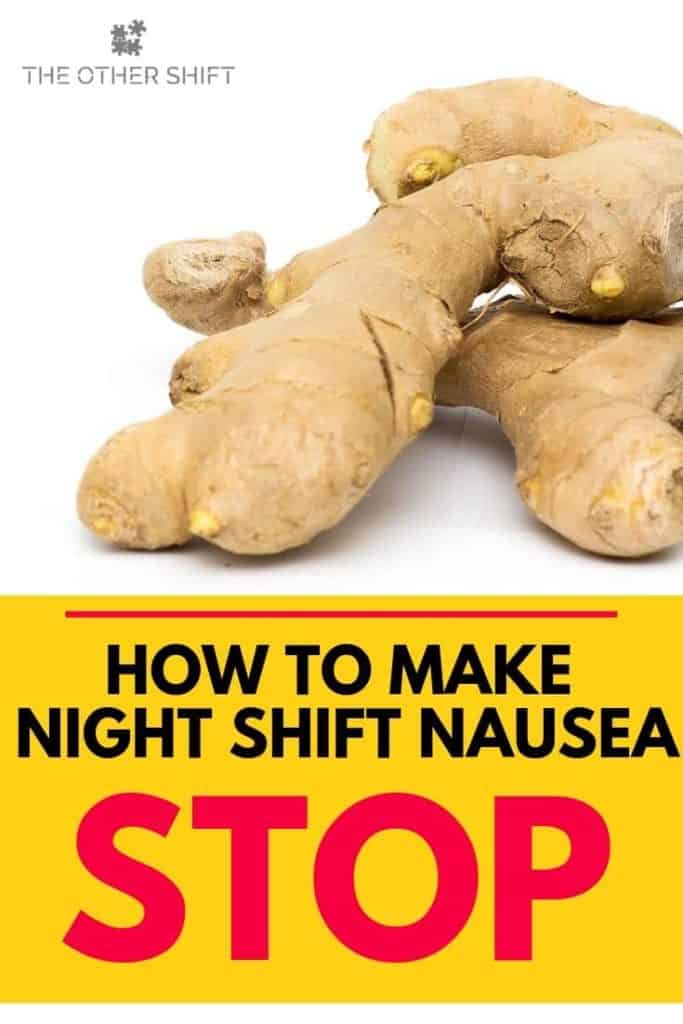Disclosure: This page may contain affiliate links, meaning we receive a commission if you decide to make a purchase through our links, but this is at no additional cost to you. Please read our disclosure and privacy statement for more info.
Why do us night shift workers seem to suffer more nausea, bloating, reflux and uncomfortable stomach pain than those who work a 9-5 job? And better yet, how can we beat this night shift “sickness.”
Night shift nausea can be caused by a combination of factors from sleep deprivation, dehydration, poor food choice and timing. But it can be prevented with prioritizing your gut health with probiotics, proper sleep regulation and avoiding your personal trigger foods during and after a shift.
I’m pretty frustrated with constantly feeling nauseated during and after a night shift and I’m sure you are too. So this article will explore the mystery behind why night shift workers specifically, seem to become nauseated during and after a shift and what we can do to prevent it from happening again in the future.
If you’re interested in the best nausea relief products you can find them on Amazon here .
.
Why Do We Get Nauseated on Night Shift?
I wish there was one single answer to this question, but unfortunately, there isn’t.
Nausea is a nonspecific symptom, with a range of different causes from pregnancy to overeating.
But here are a few reasons why night shift workers are prone to nausea.
1. Eating at a Time When Our Digestive System Is Not Ready to Process the Food
Our digestive system needs to rest and recover before starting a new day. This is supposed to happen when we are designed to sleep which is, of course, not the case for night shift workers.
Eating too much during the hours of approx 1am and 6am when the sun is NOT shining could result in food not being broken down properly. This leads to nausea, bloating, flatulence, constipation and even chronic stomach issues.
2. Being Sleep Deprived
This causes our body clock to become out of sync with our digestive system.
This annoys the bacteria within our gut causing pain, discomfort and even a higher chance of “leaking,” which allows bacteria and toxins to pass from the stomach into the bloodstream. (source)
3. Becoming Dehydrated
This one is personally HUGE for me as an ER nurse. When I become dehydrated, I struggle to concentrate, suffering from headaches, lethargy and just generally feel awful. (source)
4. Consuming Too Few Calories When Dieting
When we deprive our body with too few calories, the fuel source is zapped, leaving you unable to perform tasks to your best ability. Though it’s a fine line, ensuring you feed your body with just enough fuel to thrive is key – especially if you have weight troubles. (source) .
.
But how many calories do I need to lose weight?
To lose weight, it’s recommended women consume 1500 calories per day while men should consume 2000.
VIDEO – How To Stop Nausea and Bloating Ruining Your Night Shift
Other Reasons You Could Feel Nausea Overnight Is:
- Medication side effects (such as tablets for Insomnia and Shift Work Sleep Disorder). See Insomnia And Shift Work Sleep Disorder Medication Review
- Food poisoning
- “Stomach flu” called gastroenteritis in the medical world
- Motion sickness – very prevalent in night shift jobs in the aviation and transport industries
- Stress
- Migraines and headaches
- Pregnancy
- Issues with your gallbladder, Irritable bowel syndrome (IBS) and Gastroesophageal reflux disease (GERD). If you think reflux might be the problem, take a look at this video as it might help give you some relief.
- Peptic ulcer disease (stomach ulcers)
Acute vs Chronic Nausea
Acute nausea is generally sudden and usually resolves on its own when the bacteria clears the body. Whereas chronic nausea is either constantly present or may frequently come and go. There is usually no clear cause either. If this sounds like you it’s best to chat with your doctor and find a solution. (source)
Related Posts:
- How Long Should You Sleep Before A Night Shift?
- What’s A Swing Shift? 5 Essentials To Managing This Schedule
- Sleep Or Workout? What Should I Do After Night Shift?

How to Prevent Night Shift Nausea
Now we get into the good stuff – how to beat it!
Taking into consideration the potential causes we listed above, here are the ways we can prevent night shift nausea in the future.
Avoid Your “Trigger” Foods
Do you know what “sets off” or triggers your nausea?
Here is a list of foods commonly thought to cause bloating and nausea. Our recommendation is to either eat smaller amounts or find an alternative for these foods during working hours.
- Apples – stick to banana, grapefruit, blueberries or oranges to avoid bloating
- Carbonated drinks such as soda and energy drinks cause gas, which can get trapped in our digestive system, causing pain, nausea and excessive burping
- Tomato-based meals like spaghetti
- Red kidney beans – instead try pinto or black beans as they might be more digestible, especially after soaking.
- Lentils – If you LOVE lentils try eating the light-colored lentil varieties as they are generally lower in fiber than darker ones.
- Spicy foods such as curry, hot sauce, jalapeno flavored corn chips
- Fried foods such as fries, hash browns, take-out burgers
- Super fatty, processed foods such as honeybuns
- Too much coffee
- Wheat due to the gluten -try a gluten-free option for your breads and wraps and see if it makes a difference.
What triggers your nausea and bloating from this list?
If you don’t know, it might take you a few nights to figure out what is causing your symptoms, but it’s well worth the experiment.
Try writing down, even in the notes section of your phone, everything you ate during a 24 hour period to figure out some common trends to avoid in the future.
It might also not be a bad idea voicing these foods to your doctor during your next checkup. This is to make sure you are not eating foods you didn’t know contained certain ingredients you were trying to avoid.
No two people are the same, so take the time to figure out what is causing you discomfort even if your workmates don’t seem to be having any issues. In the mean time, sticking to “plain foods” like breads, rice and dry crackers could be a good place to start.
**32** the magic (average) number of how many time we should chew our food
Chewing your food for longer can reduce stomach bloating and nausea. Interesting it allows your body to extract the greatest possible amount of nutrients from the food you eat. (source)

Eating Substantial Meals and Snacks to Prevent Night Shift Nausea
Though pizza, chips, donuts, coffee and energy drinks may be delicious and work to give you an energy hit, these foods and drinks will put you on the path to becoming nauseated.
Our digestive system cannot keep processing these high carb, high sugar foods ALL night. It needs a break. Its way of retaliating to your bad habits is to provide pain, bloating and nausea.
If you want your body to perform on the job, then you need to give it the right fuel to get the outcomes you want.
Here are some tips for eating substantial meals and snacks during night shift to prevent nausea
- Eat your “main meal” before you leave for a shift.
This ensures you are full for at least the first couple of hours into your shift without needing to think about food. Plus, your digestive system is more awake at 8pm than it is at 3am.
- Eat small snacks rather than eating a second “main” meal
If you feel hungry during a shift, change your thinking from needing a “second dinner” or a “big lunch” to small, high protein snacks like tuna, eggs, avocado, nuts and cottage cheese. Overeating is a HUGE cause of night shift nausea you can easily avoid.
If you need more ideas, these two posts will help provide some night shift food inspiration.
– 6 Healthy, Freezable Shift Work Meal Ideas for Beginners.
– 10 Healthy Snacks Ideal for Hungry Night Shift Workers
- Never skip breakfast once you get home (even if you’re not hungry).
Read What Should I Eat After Working Night Shift? for some tasty tips which actually help you sleep too!
- Avoid feeding the vending machine your hard-earned money.
The snacks inside may be delicious but you’ll probably be hungry again in an hour and feel horrible stomach pain. The cycle is a never-ending trap!
- Don’t eat just one food group.
A colorful mix of veggies, fruits, grains and protein will help avoid nausea. If eating sandwiches limits nausea as it does for me, just make sure the other meals in your day, before and after a shift, are something different like a sty-fry or oats. Read – 12 Valuable Meal Prep Tips for Busy Shift Workers
Find Consistent Meal Times Where Possible on Night Shift
I know to establish a meal routine while working nights can be difficult, particularly when working in an unpredictable environment like a hospital. But research has suggested those night shift workers who ate at a similar time every shift have less digestive issues over those who ate randomly. (source)
If you work as part of a team, can you volunteer to have a break at a particular time rather then “whenever”?
Can you have shorter breaks more often over one long break? This is mostly dependent on the work situation but it worth considering if you suffer from nausea overnight.
As for when to eat while on night shift check out this post titled, When Should I Eat on Night Shift? for a full run down on when to eat and why.
Dieting? Eat Enough Calories Whilst on Night Shift
Finding the right balance between calories in and calories out can be tricky. But be careful about placing the body in a situation where it has little calories to burn as fuel, as it can cause nausea and headaches.
Using a notepad to physically write down the calories you’ve eaten in a day vs what you have burnt can make this more obvious. Or using a calorie tracker like this popular one from Amazon makes the process super easy.
popular one from Amazon makes the process super easy.
If you are trying to lose weight, we want to teach you how to do it safely. Here are a few posts I think you’ll enjoy.
- Keto: Graveyard Weight Loss: Shift Workers Guide to the Keto Diet
- Intermittent fasting: Should I Eat on Night Shift? Why Intermittent Fasting Works
- 12-hour shifts: How Can I Lose Weight Working 12-Hour Night Shifts?
Weight loss foods: 15 Best Foods for Weight Loss on Night Shift
When should I consult my doctor about night shift nausea?
Generally, night shift nausea is treatable (and preventable) with diet changes, however if you notice black/tarry stools, confusion, high fever, severe nausea pain, chest pain and vomiting that won’t stop or blood in your stools or vomit, it’s time to see your doctor. It could also be a good time to rule out any food intolerances or allergies you hadn’t considered.
Eat and Drink More Ginger To Relieve Night Shift Nausea
My mom is a huge advocate for using lemon and ginger tea for treating (and preventing) illness and nausea. And it seems research and history backs up my mom’s claims to the power of ginger. (source)
I won’t enter into the specifics about how it works in the cells because that’s just too much for any night shift workers brain to understand. So instead, I’m going to give you a few options on how to eat and drink more ginger.
- Tea
Cut up a chunk of fresh ginger (no need to peel) and pour boiling water over it. Add a little honey and lemon for the perfect hot drink in the 5-6 hours before bed when we should be avoiding caffeine. Pre-cutting the ginger before a shift makes this process easier too.
- Supplements
Check out these popular Turmeric Curcumin with Ginger capsules on Amazon.
capsules on Amazon.
- Soups
Add some spicy zest to your soup by putting in freshly grated or pureed ginger.
- Fish
We know fish is a great source of protein and recommended for those working nights, so why not add some ginger for some extra flavor and health benefits?
- Stir-frys
Sneaking in veggies and protein before a night shift can be made even more powerful with some ginger.
- Sparkling ginger water
If you crave the bubbles on night shift but you’re trying to move away from traditional soda, these sparkling ginger water drinks on Amazon are well worth a look.
sparkling ginger water drinks on Amazon are well worth a look.
- Ginger jam
Honestly, I’ve never tried this but I’m fascinated. Whether you’re buying it from the store or making it yourself, just watch the sugar content as we don’t want to mess around with our insulin levels too much.
- Coffee
Before you say “absolutely not” to this suggestion, adding 1 teaspoon of ground ginger (as pictured below) into your coffee can provide you with a HUGE antioxidant boost that can help decrease the signs of aging, getting sick AND nausea.

When buying ginger look for full, plump roots that are juicy and not dried out on the ends
Consider Taking a Probiotic On Night Shift
I never really understood what probiotic tablets actually did until recently after reading far too many medical journals.
To summarize, they are basically live bacteria that hang out in your digestive tract, which support your body’s ability to absorb nutrients and fight infection. There are a ridiculous amount of these molecules in the gut in comparison to the rest of the body and why we need to care about them.
According to Dr Ax, an online health expert I often refer to, states “probiotics benefits have been proven effective in supporting immune function, reducing inflammation, promoting healthy digestion, as well as maintaining beautiful skin, especially when combined with prebiotics”. (1) (2) (3 )
)
This sounds like ALL the things we want as night shift workers, right?
If you’re interested in adding probiotics into your diet there are three main ways to go about it:
- Fermented and sour foods like tempeh, raw cheese, yogurt, pickles and sauerkraut
- Fermented drinks like kombucha
- Through a supplement
If adding fermented foods into your diet while on shift is not achievable for whatever reason, why not try taking a probiotic supplement?
There is much to know about starting a new dietary supplement like a probiotic, especially if you already take a bunch of different medicines, so it’s best to consult your doctor before diving in. (source)
When should I take a probiotic?
Most of the medical professions say to take it in the morning about 15-30 minutes before breakfast. But for night shift workers taking it in the afternoon after rising but before you eat is a good idea. This makes sure it hits your digestive system quickly without getting stuck behind a meal.
Drink Water Before You Have a Dry Mouth
Once our brains and bodies feel dehydrated, it’s already working much harder than it needs to, so drink up!
If you’re struggling to physically drink the recommend 2L of water (67oz), homemade soups and “water-dense” fruits and veggies like zucchini, cucumber and lettuce are a great way to increase the amount of water you’re consuming.
If drinking this much water is doable, don’t hide your bottle or cup behind the shelves or in a cupboard as we often need a constant reminder to drink BEFORE our mouths become super dry.
Here is our favorite drink bottle to take to a shift because you can infuse fruit and it doesn’t leave you with a mouthful of pips. Plus, it comes with a sweat sleeve, preventing the other items in your work bag from getting damp and ruined. Darn great idea I wish I had of thought of!

Prioritize Sleep
I know we talk about this plenty, particularly in a recent post we wrote titled, Is Night Shift Bad For You? 11 Truths Uncovered but sleep, or should I say lack of it causes some problems. And big ones at that if we don’t take control of it.
but sleep, or should I say lack of it causes some problems. And big ones at that if we don’t take control of it.
If you currently have sleep down on the priority list, here are some tips to push it back up, specific to working night shift.
- Go to bed within 30 minutes – 1 hour of getting home from a night shift.
Don’t switch on a full-length feature film or get sucked into playing an addictive video game. Leave this until you get up or for a day off.
- Wear blue light blocking glasses.
This makes sure you are giving your main sleep hormone melatonin, the best shot at doing its job properly. If you have never heard about these glasses, check out our shift work resources page here, where we give you our recommendations on what to buy and why. These blue light glasses have honestly been a game-changer for us and we wear them every day/night!


- Have a consistent sleeping routine and be strict with yourself about sticking to it
- Charge your phone outside the bedroom to limit distractions and also the blue light.
- Block out the light using blackout blinds. Here are our favorites
 for a very reasonable price.
for a very reasonable price.
Related post:
- Adjusting to nights: How Long Does It Take To Adjust To Night Shift?

- Can’t sleep: Can’t Sleep After Night Shift? 13 Weird Tips That Actually Work

- Best practices: 9 Shift Work Best Practices You’re Probably Not Doing

Consult Your Doctor About Taking a Motion Sickness Type Tablet on Night Shift
Dramamine is a type of motion sickness tablet that may help some night shift workers who are affected by motion during their job. Professions like aviation, transportation, night construction, paramedic, etc. could welcome this.
Tablets like these, as well as metoclopramide and ondansetron, are two other anti-nausea medications your doctor may prescribe which can help take the edge off your night shift nausea experience.
However, if you’re not too keen on taking another tablet then here are a few options from Amazon:
- Motion sickness patch

- Natural oils
 you can easily roll on
you can easily roll on - Motion sickness wrist band
 (pictured below)
(pictured below)
Give Kombucha a Go for Night Shift Nausea Relief
It’s known as the “Immortal Health Elixir” by the Chinese and is starting to become a trendy fizz craze in health food stores everywhere. But why is that?
Well, it contains a large number of healthy bacteria known as probiotics due to the fermentation process involved in creating kombucha. These bacteria hang around in our digestive track supporting our immune system by absorbing nutrients and fighting infection and illness. (source)
Basically, it’s EXCELLENT for our gut health which is something shift workers constantly have issues with.
Kombucha is also a great alternative for drinking soda, which is often linked with bloating and nausea during a shift.
You should be aware that kombucha does contain bubbles which may have a negative effect on some night shift worker in regards to nausea.
We recently wrote a post titled, What Should I Drink on Night Shift? 10 Energy Boosting Beverages which explains more about kombucha and the brands we are currently trying out for better gut health.
which explains more about kombucha and the brands we are currently trying out for better gut health.
Did you know that the gut is considered our “second brain?” Yep, about 80 percent of your immune system is located in your gut, making it the second largest part of your neurological system.
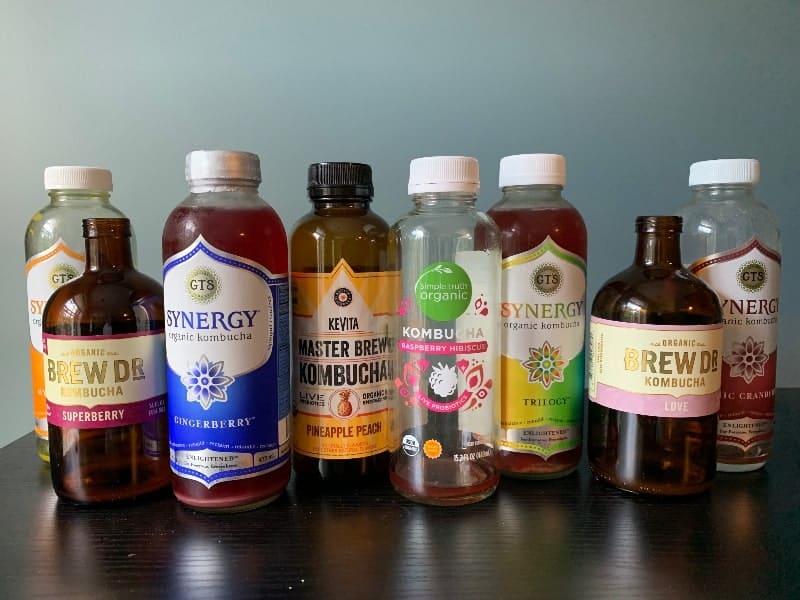
How to Beat Nausea AFTER Night Shift
While nausea during a shift is pretty awful, so too is that reflux and discomfort felt after a night shift.
Here are some ways to beat these feels post night shift:
- Add some ginger into your breakfast such as in your granola bowl, mixed into your scrambled eggs or in a freshly brewed cup of tea.
- Drink peppermint tea. This is my go-to after nights to ease digestion and reduce nausea and bloating after a shift. Plus, it helps me relax and wind down.
- Eat a BRAT diet. I had never heard of this diet, but apparently, it’s proven to reduce diarrhea, but can also help symptoms of nausea and vomiting. Bananas, rice, applesauce and toast are the foods you could reach for – in the short term only, to reduce nausea after nights. (source)

- Use aromatherapy oils. We talk about these oils a lot particularly here
 , but lavender and peppermint are those most associated with calming the stomach and helping nausea. Check out the lavender oils we love and use here via Amazon. While it’s a little more expensive, it lasts much longer!
, but lavender and peppermint are those most associated with calming the stomach and helping nausea. Check out the lavender oils we love and use here via Amazon. While it’s a little more expensive, it lasts much longer!
- Try acupressure – Targeting the pressure point that eases motion sickness can keep nausea at bay before you jump in bed. This point is called the Pericardium 6 (PC6), located on your wrist. You can easily find it by turning your hand over and placing three fingers at the crease of your wrist with your palm up. The area just next to your index finger, between the two tendons, is the spot. Apply pressure and release after 3-4 seconds. (source) Excuse our rug in the background!
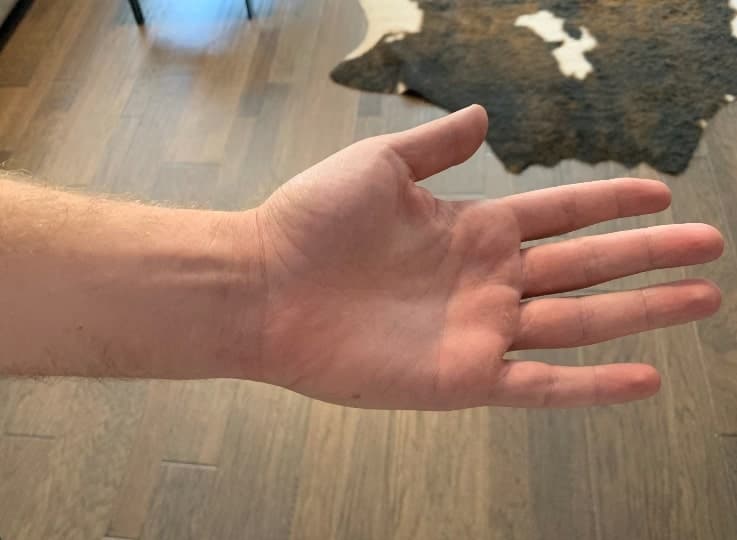
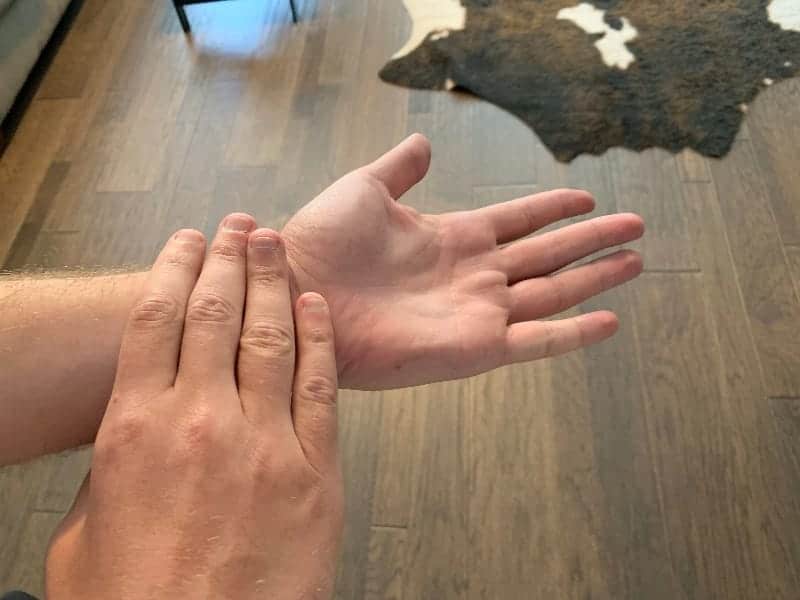
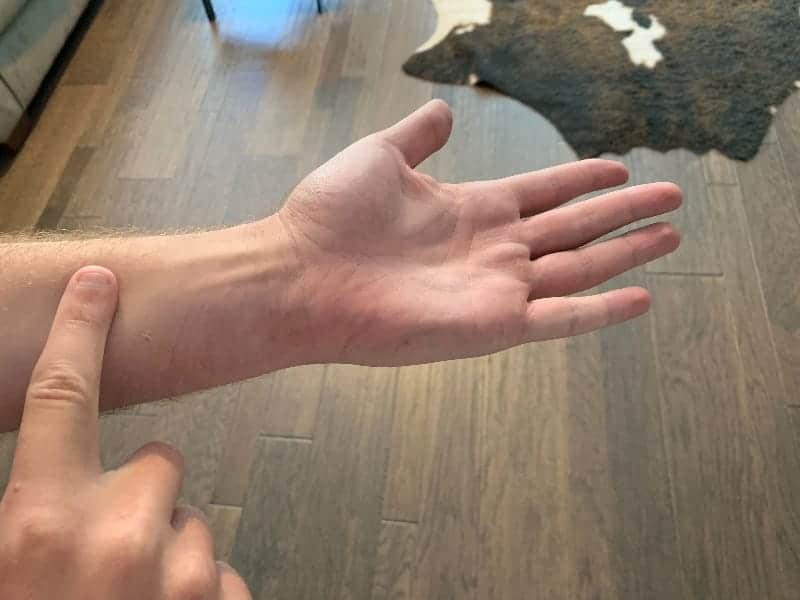
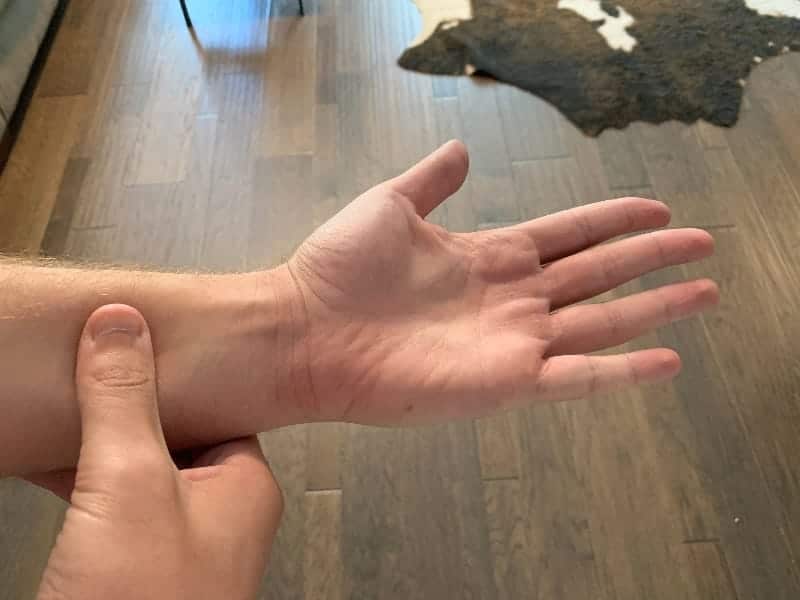
Next…
- Burnout: Shift Work Burnout: Causes, Red Flags and How to Beat It

- Staying fit: How to Stay Fit While Working Nights: 12 Sneaky Tips

- Days off: Help! Should I Stick To A Night Shift Schedule On Days Off?
Summary: What Causes Night Shift Nausea and How to Finally Beat It
If you are falling victim to night shift nausea, it doesn’t have to be like this forever.
Try re-evaluating your diet, food timing and adding helping foods like ginger, lavender and peppermint to see if that makes a difference.
If nausea continues despite your continued best efforts, it’s best to seek guidance from your doctor and work out a plan of attack.
How do you resolve your night shift nausea?
Cheers,

Disclosure: This page may contain affiliate links, meaning we receive a commission if you decide to make a purchase through our links, but this is at no additional cost to you. Please read our disclosure and privacy statement for more info.





